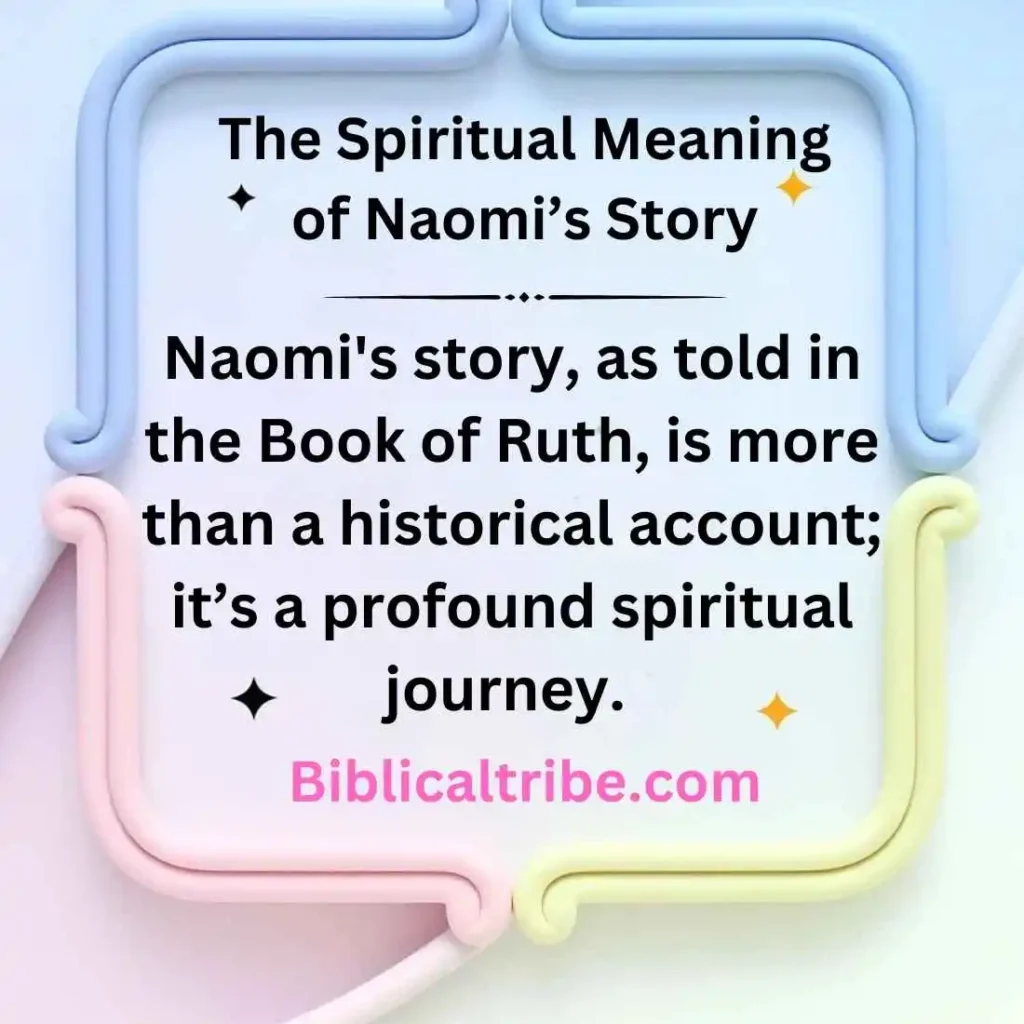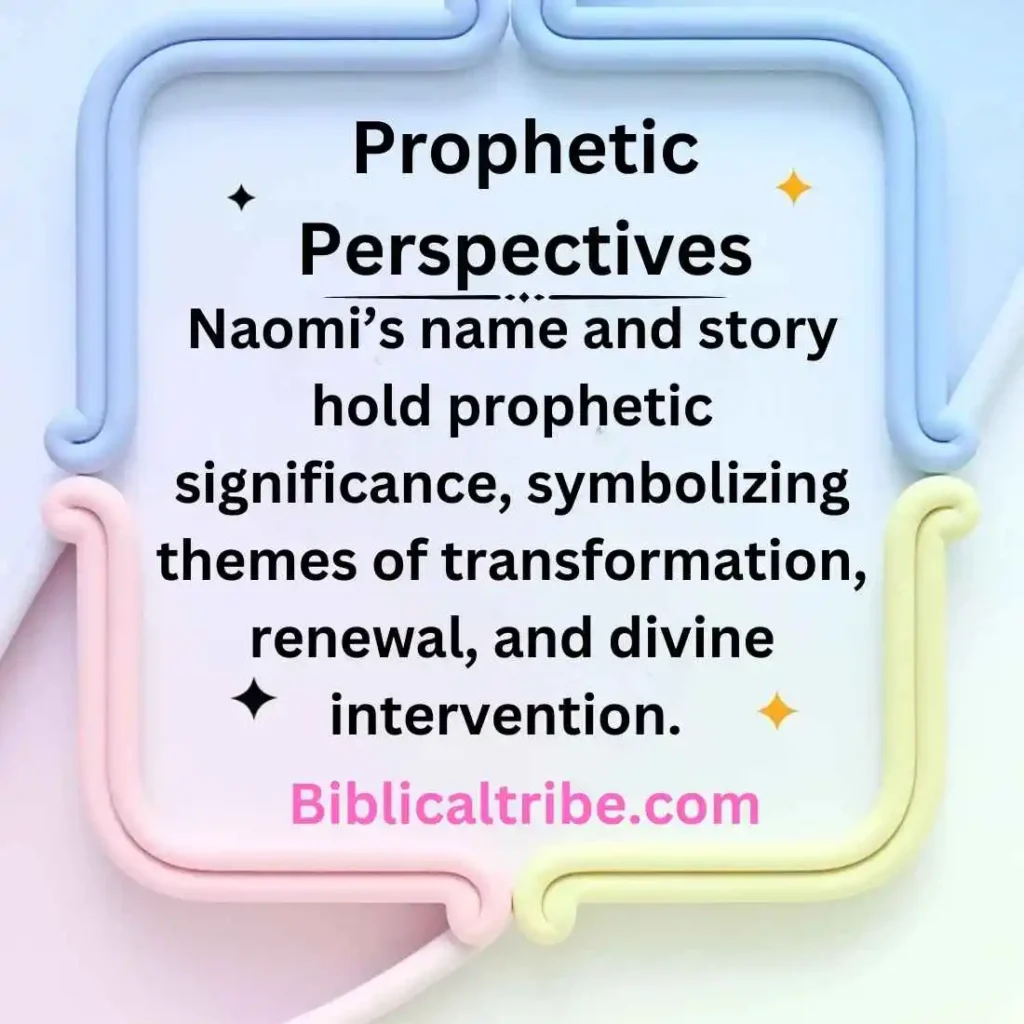Last Updated on November 11, 2024 by Ethan Richards
Naomi’s story in the Bible is one of profound depth and resilience, offering valuable insights into human experience and divine providence.
This comprehensive exploration delves into Naomi’s character, her journey through loss and redemption, and her lasting impact on biblical history.
Naomi’s story in the Bible offers deep spiritual lessons on faith, resilience, and redemption. Through her journey of loss, loyalty, and transformation, Naomi’s life illustrates the importance of trust in divine guidance even in the hardest times. Discover how her legacy of hope continues to inspire believers around the world.
By understanding Naomi’s story, we uncover not only the spiritual lessons embedded in her narrative but also its broader implications for faith and personal growth.
The Spiritual Meaning of Naomi’s Story

Naomi’s story, as told in the Book of Ruth, is more than a historical account; it’s a profound spiritual journey.
Naomi’s narrative illustrates themes of loss, loyalty, and redemption, revealing how personal faith and divine intervention interplay in times of hardship.
Naomi, whose name means “pleasantness” in Hebrew, experiences significant personal trials that transform her into a symbol of resilience.
Her journey from joy to bitterness and back again highlights the transformative power of faith and the hope that can emerge from even the most challenging circumstances.
The Character of Naomi: From Pleasantness to Bitterness
Naomi begins her story as a joyful and pleasant figure. She, along with her husband Elimelech and their two sons, leaves Bethlehem during a time of famine and relocates to Moab.
However, her life takes a tragic turn with the death of her husband and later, her sons. These events prompt Naomi to change her name to Mara, meaning “bitter,” reflecting her profound grief and sense of loss.
Key Points:
- Naomi’s initial portrayal as a joyful figure contrasts sharply with her later bitterness.
- The transition from “pleasantness” to “bitterness” symbolizes her deep emotional and spiritual struggle.
Naomi’s Journey through Loss and Redemption
Naomi’s journey through grief and loss ultimately leads to redemption. After her sons’ deaths, Naomi returns to Bethlehem with her daughter-in-law Ruth.
Ruth’s unwavering loyalty and commitment become instrumental in Naomi’s path to recovery and restoration.
Key Stages of Naomi’s Journey:
- Loss: Naomi faces the death of her husband and sons, leading to her emotional and spiritual anguish.
- Return: Naomi’s decision to return to Bethlehem signifies a step towards healing and hope.
- Redemption: The eventual marriage of Ruth to Boaz and the birth of Obed brings Naomi joy and restores her faith.
Naomi in the Hebrew Bible: A Story of Resilience and Hope
Naomi’s narrative is a powerful testament to resilience and hope in the Hebrew Bible. Despite the significant losses she endures, Naomi’s story demonstrates that faith and loyalty can lead to redemption and renewal.
The book of Ruth shows how Naomi’s steadfastness and the support of her daughter-in-law lead to a reversal of fortune.
Themes:
- Resilience: Naomi’s ability to overcome adversity.
- Hope: The renewal of joy and faith through divine intervention.
From Naomi to Mara: The Bitterness of Loss
The name change from Naomi to Mara represents a significant emotional shift. Mara, meaning “bitter,” reflects Naomi’s deep sorrow and sense of injustice.
This change underscores the impact of personal loss on one’s identity and outlook.
Significance:
- Symbolism: The name change symbolizes Naomi’s grief and the profound effect of loss on her spirit.
- Cultural Context: Name changes in biblical times often reflected significant personal or communal changes.
Understanding Naomi’s Heartache and Despair
Naomi’s heartache and despair are central to her story. Her narrative provides a poignant depiction of grief, capturing the emotional turmoil that accompanies such profound loss.
Naomi’s experience resonates with many who have faced similar struggles, offering a mirror to their own experiences.
Emotional Aspects:
- Grief: Naomi’s deep sorrow following the deaths of her loved ones.
- Despair: The sense of hopelessness that accompanies her loss.
The Cultural Context of Name Changing in Biblical Times
In biblical times, names were not merely labels but held deep personal and cultural significance.
Changing a name often signified a major shift in one’s life or identity, reflecting changes in fortune, status, or personal feelings.
Cultural Insights:
- Significance of Names: Names in biblical culture often reflected personal and spiritual states.
- Impact on Identity: Changing a name could indicate a profound personal transformation or change in circumstances.
Naomi and Ruth in the Bible: A Testament to Unyielding Loyalty

The bond between Naomi and Ruth is a cornerstone of Naomi’s story. Ruth’s loyalty to Naomi, despite the personal cost, highlights the profound nature of their relationship and its impact on both their lives.
Key Moments:
- Ruth’s Commitment: Ruth’s decision to stay with Naomi and her subsequent actions demonstrate unwavering loyalty.
- Impact: This loyalty leads to significant personal and social outcomes, including Ruth’s marriage to Boaz and the restoration of Naomi’s joy.
Ruth’s Dedication to Naomi: Influence and Outcome
Ruth’s dedication to Naomi is a critical element in Naomi’s story. Ruth’s loyalty and dedication influence the course of their lives, ultimately leading to Naomi’s redemption and the continuation of her family line.
Influence:
- Personal Impact: Ruth’s support provides Naomi with emotional and practical assistance.
- Outcome: Ruth’s dedication leads to her marriage to Boaz and the birth of Obed, which significantly impacts Naomi’s life.
Naomi’s Guidance and Its Impact on Ruth’s Marriage to Boaz
Naomi plays a pivotal role in guiding Ruth toward Boaz, a kinsman-redeemer. Naomi’s advice and strategic actions facilitate Ruth’s marriage to Boaz, which is crucial for their family’s future.
Guidance:
- Strategic Advice: Naomi instructs Ruth on how to approach Boaz, demonstrating her wisdom and understanding of cultural practices.
- Impact: Ruth’s marriage to Boaz results in the birth of Obed, linking Naomi to the Davidic line.
Understanding the Role of a Kinsman-Redeemer through Naomi’s Advice
The concept of a kinsman-redeemer is central to Naomi’s guidance to Ruth. A kinsman-redeemer was responsible for preserving family lineage and property.
Naomi’s advice helps Ruth navigate this role and secure her future.
Key Aspects:
- Definition: The kinsman-redeemer’s role included marrying a relative’s widow and redeeming family property.
- Naomi’s Influence: Naomi’s understanding of this role helps Ruth and Boaz fulfill this cultural obligation.
Naomi’s Legacy in the Bible: Contributing to the Lineage of Christ
Naomi’s legacy extends beyond her immediate story to play a significant role in the lineage of Christ.
Her great-grandson, King David, is a pivotal figure in biblical history, and Jesus is a descendant of David.
Legacy Highlights:
- Lineage: Naomi’s great-grandson, Obed, is the father of Jesse, who is the father of King David.
- Significance: Naomi’s story links directly to the genealogy of Jesus, illustrating divine providence and fulfillment of prophecy.
The Significance of Obed, Naomi’s Grandson, in Biblical History
Obed’s role in biblical history is crucial. As Naomi’s grandson, his birth marks a significant turn in Naomi’s fortunes and the beginning of a lineage that leads to King David and, ultimately, Jesus.
Historical Impact:
- Obed’s Role: Obed’s birth represents the restoration of Naomi’s family line and future significance.
- Genealogical Importance: Obed is an important link in the genealogical line leading to the Messiah.
Tracing the Genealogical Importance from Naomi to King David and Jesus
Naomi’s story is intricately linked to the genealogical line leading to King David and Jesus.
This lineage underscores the significance of Naomi’s life and the divine orchestration of events in biblical history.
Genealogical Path:
- Naomi to Obed: Naomi’s lineage continues through her grandson Obed.
- Obed to David: Obed is the grandfather of King David.
- David to Jesus: David’s lineage continues to Jesus, fulfilling Old Testament prophecies.
Recognizing Divine Providence through Naomi’s Life
Naomi’s life is a testament to divine providence. Despite her significant losses and challenges, her story demonstrates how divine intervention and faith lead to eventual redemption and fulfillment of promises.
Divine Providence:
- Examples of Intervention: Naomi’s return to Bethlehem and Ruth’s loyalty highlight instances of divine guidance.
- Fulfillment of Promises: Naomi’s story reflects the fulfillment of God’s promises through her lineage.
Biblical Meaning of Naomi: Prophetic Perspectives

Naomi’s name and story hold prophetic significance, symbolizing themes of transformation, renewal, and divine intervention.
Her narrative aligns with broader biblical prophecies concerning redemption and the coming Messiah.
Prophetic Elements:
- Symbolism: Naomi’s transformation from “pleasantness” to “bitterness” and back again symbolizes spiritual renewal.
- Alignment with Prophecy: Naomi’s story aligns with prophecies about the Messiah’s lineage and redemption.
Naomi as a Figure of Prophecy and Redemption
Naomi serves as a figure of prophecy and redemption in the Bible.
Her life story embodies themes of personal and collective redemption, illustrating how individual experiences contribute to the broader narrative of salvation.
Prophetic Role:
- Redemption: Naomi’s story highlights the theme of redemption through personal and familial restoration.
- Prophetic Foreshadowing: Naomi’s life and lineage foreshadow the coming of the Messiah.
Exploring the Foreshadowing in Naomi’s Story
Naomi’s story contains elements of foreshadowing, pointing to future events and figures in biblical history.
Her life experiences and the outcomes of her story serve as a prelude to significant developments in the biblical narrative.
Foreshadowing Elements:
- Ruth’s Role: Ruth’s loyalty and marriage to Boaz foreshadow the establishment of David’s line and the coming of Jesus.
- Naomi’s Redemption: Naomi’s personal redemption reflects the broader theme of divine restoration and fulfillment.
Naomi’s Significance in Biblical History: Enduring Teachings
Naomi’s story offers enduring teachings that continue to resonate with readers today. Her experiences provide valuable lessons on resilience, faith, and the power of loyalty.
Enduring Lessons:
- Resilience: Naomi’s ability to overcome adversity is a powerful example of resilience.
- Faith: Her story highlights the importance of faith in the face of challenges.
Naomi Meaning in the Bible: Personal Reflections
The name Naomi means “pleasantness,” reflecting her initial character and the eventual restoration of joy in her life.
Personal reflections on Naomi’s story can offer insights into one’s own experiences and challenges.
Personal Reflections:
- Name Meaning: Naomi’s name signifies a return to joy and pleasantness after a period of bitterness.
- Relating to Naomi: Readers can find personal meaning in Naomi’s journey and apply her experiences to their own lives.
Identifying with Naomi’s Struggles and Triumphs
Many people can identify with Naomi’s struggles and triumphs. Her story resonates with those who have faced personal loss and sought redemption and hope.
Identification:
- Struggles: Naomi’s experiences mirror common human struggles with grief and loss.
- Triumphs: Her eventual restoration and joy provide a hopeful perspective for those facing similar challenges.
Applying Naomi’s Spiritual Insights to Modern Life Challenges
Naomi’s story offers valuable spiritual insights that can be applied to modern life challenges. Her experiences with loss, loyalty, and redemption provide practical lessons for overcoming adversity.
Applications:
- Dealing with Loss: Naomi’s story provides guidance on coping with grief and finding hope.
- Loyalty and Faith: The lessons of loyalty and faith in Naomi’s life can inspire individuals to remain steadfast in their own challenges.
Numerological Meaning of the Name Naomi
In numerology, the name Naomi has specific meanings and associations. Understanding these can add another layer of significance to her story and name.
Numerological Significance:
- Numerological Value: The name Naomi corresponds to certain numbers that hold symbolic meanings.
- Symbolism: These meanings reflect aspects of Naomi’s character and story.
Popularity of the Name Naomi
The name Naomi has maintained a consistent level of popularity throughout history. Its enduring appeal is linked to its biblical significance and the positive qualities associated with it.
Popularity Trends:
- Historical Popularity: The name Naomi has been popular across various cultures and periods.
- Current Trends: It remains a popular choice for baby names due to its historical and spiritual significance.
Is Naomi a Good Name for Your Baby Girl?
Choosing a name for a baby is a significant decision. Naomi’s name carries historical, spiritual, and personal significance, making it a meaningful choice for a baby girl.
Considerations:
- Historical Significance: Naomi’s name is deeply rooted in biblical history.
- Personal Meaning: The name’s meaning and associations may resonate with parents seeking a name with spiritual and cultural depth.
FAQs
1. What is the spiritual significance of Naomi in the Bible?
Naomi’s story in the Book of Ruth highlights themes of faith, loyalty, and redemption. Her journey from bitterness to blessing teaches us the importance of trusting in God’s plan, even in times of hardship. Naomi’s role as a mother-in-law to Ruth exemplifies selflessness and divine providence in the face of adversity.
2. How does Naomi’s story connect with themes of hope and restoration?
Naomi’s loss of her husband and sons symbolizes loss and grief, but her eventual restoration through Ruth’s loyalty demonstrates the power of hope. Her story encourages us to remain faithful, trusting that God’s plan often includes unexpected redemption and restoration in our lives.
3. What legacy did Naomi leave in the Bible?
Naomi’s legacy is not just in her bloodline but in the spiritual lessons of compassion, resilience, and divine trust. Through her daughter-in-law Ruth, Naomi becomes part of the lineage of King David, showing how God’s work can be revealed through ordinary people with unwavering faith.
4. Why is Naomi’s relationship with Ruth so significant?
The relationship between Naomi and Ruth exemplifies devotion and selflessness. Ruth’s decision to stay with Naomi despite the challenges reflects a deep spiritual connection, demonstrating how love and loyalty can lead to profound spiritual growth and the fulfillment of God’s purpose.
5. How can Naomi’s story inspire modern believers?
Naomi’s story serves as a powerful reminder of how faith in God can guide us through life’s most difficult moments. Her eventual joy and restoration show that even in times of suffering, there is always the possibility for spiritual growth and a greater understanding of God’s plan for our lives.
Conclusion
Naomi’s story in the Bible resonates deeply with themes of faith, resilience, and redemption. Her journey from hardship to hope demonstrates the power of divine providence and the importance of loyalty and family.
Despite experiencing profound loss, Naomi’s unwavering faith in God set the stage for the eventual restoration of her life, culminating in the birth of Obed, who became the grandfather of King David.
Her legacy continues to inspire those who face adversity, reminding us that even in moments of despair, God’s plan can lead to restoration and blessing.
Through Naomi, we see how personal struggles can transform into a greater purpose, and her story remains a beacon of hope for many.

Matthew Porter combines his passion for theology with an extensive study of dreams. His analytical approach and eloquent writing style make complex interpretations accessible, helping readers uncover the hidden messages in their dreams and connect with their spiritual path.










